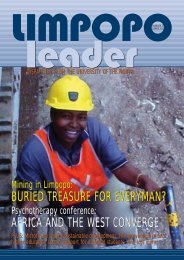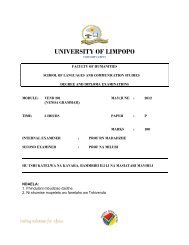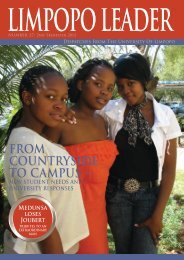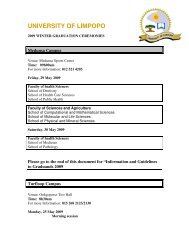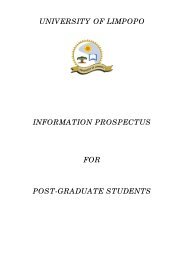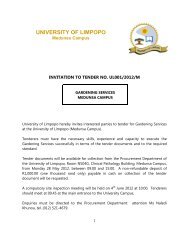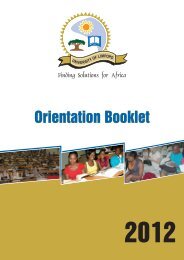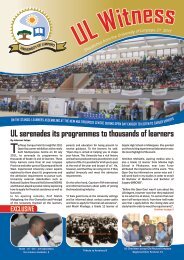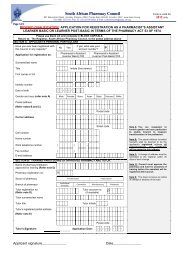Limpopo Leader - University of Limpopo
Limpopo Leader - University of Limpopo
Limpopo Leader - University of Limpopo
You also want an ePaper? Increase the reach of your titles
YUMPU automatically turns print PDFs into web optimized ePapers that Google loves.
World economic crisisMBOWENI SPEAKS ON TURFLOOP CAMPUScrude oil futures prices are currently around US$54per barrel for delivery in the second quarter <strong>of</strong> 2009.South Africa’s export commodity price indexcontinued to recover through February 2009, althoughit remains much lower than the record highs registeredin early 2008. Inflation projections for advancedeconomies as well as emerging-market and developingeconomies were revised downwards for 2009 in theforecasts released by the IMF in January 2009,moving up again only in 2010.Meanwhile, South African banks had recordedstrong asset growth in recent years. Total bank assetsamounted to R3,2-trillion in January 2009, rising fromR2,7-trillion in January 2008, reflecting a growth rate<strong>of</strong> 20 percent over twelve months. This rate had nowslowed. Government revenue, boosted in recent yearsby improved tax compliance and administration, willalso decrease as economic activity slows, unemploymentrises and disposable income drops.Against this general background 1 <strong>of</strong> short-termgloom with brighter prospects for 2010, Mboweniprovided a set <strong>of</strong> specific interpretations to guide hisaudience to a more practical grasp <strong>of</strong> the crisis.He started by stressing that the global economywas inextricably integrated. What happened in onepart <strong>of</strong> the world affected other parts. He gave asan example the case <strong>of</strong> South Korea. That heavilyindustrialised country depended for its economicstability on the export <strong>of</strong> manufactured goods. If theUnited States, one <strong>of</strong> South Korea’s major exportmarkets, goes into recession, then demand for SouthKorea’s products lessens. Now add to this lesson incause and effect the fact that South Korea buys a lot<strong>of</strong> its raw materials from South Africa. Inevitably,South Korea’s raw-material demand is reduced, whichin turn means that South Africa will need to reduceraw-material production, which ultimately willtranslate into job losses in South Africa.‘We’re living in a connected world,’ Mbowenisaid. ‘There is no exclusively South African way <strong>of</strong>dealing with the crisis. We’re part <strong>of</strong> hugeinterdependencies. That’s what it means to be part<strong>of</strong> the global economy.’In consequence <strong>of</strong> these interdependencies,developing countries will not be able to escape theeffects <strong>of</strong> the crisis. African countries will definitely notescape, Mboweni said. However, they could alleviatesome <strong>of</strong> their vulnerability by reducing their relianceon development aid and by fighting the corruption intheir governments. He referred, as an example, toNigeria as ‘a potentially rich economy’, but thenalluded to the recent theft in a Nigerian port <strong>of</strong> anentire oil tanker.‘There’s a lot to be done in Africa,’ he told hisaudience. ‘Budgets and currencies in circulationshould relate to production levels. Corruption acrossthe continent will have to be stamped out, and selfsufficiencyaimed at. The continent must stopdepending on handouts from the developed world.’Mboweni said that the bulk <strong>of</strong> South Africa’snational budget was increasingly becomingindependent <strong>of</strong> remittances by forgeign donors.Budget deficits were not funded by the InternationalMonetary Fund, but by borrowing through openmarket transactions. The point, however, was not toallow large budgetary deficits. That meant livingwithin one’s means. Over recent years, South Africahad moved from large deficits to small deficits, and toa target <strong>of</strong> breaking even, or even to a small surplusas had occurred in the last financial year (2007/08).‘To run a big deficit now would not be sensible,’ hesaid. ‘It’s not a good time to go to the Sovereign BondMarkets: the recession has pushed up interest rates.’A member <strong>of</strong> the audience asked whether it wasa good idea to bale out industries such as the automobilemanufacturers. Mboweni replied by saying that‘no amount <strong>of</strong> state money will reverse shrinking orderbooks’. The industries themselves – management andlabour – should make their own arrangements to copewith reduced production. Shortened hours <strong>of</strong> work, jobsharing, and other solutions needed to be developedbefore actual job losses were incurred.‘Instead <strong>of</strong> trying to support ailing industries weneed to improve consumer confidence,’ Mboweniasserted. ‘This will take a while, and in the interim joblosses will be inevitable. Fortunately, in South Africa,the current high levels <strong>of</strong> public works – for example,the construction <strong>of</strong> the Gautrain and other 2010 infrastructure– will help with employment for a time. Butthe world economic crisis will be accompanied by1 Dorcas Manzini <strong>of</strong> the <strong>University</strong> <strong>of</strong> <strong>Limpopo</strong> Communications Department collated the background facts used in this coverage <strong>of</strong> GovernorMboweni’s lecture.P A G E 1 2



